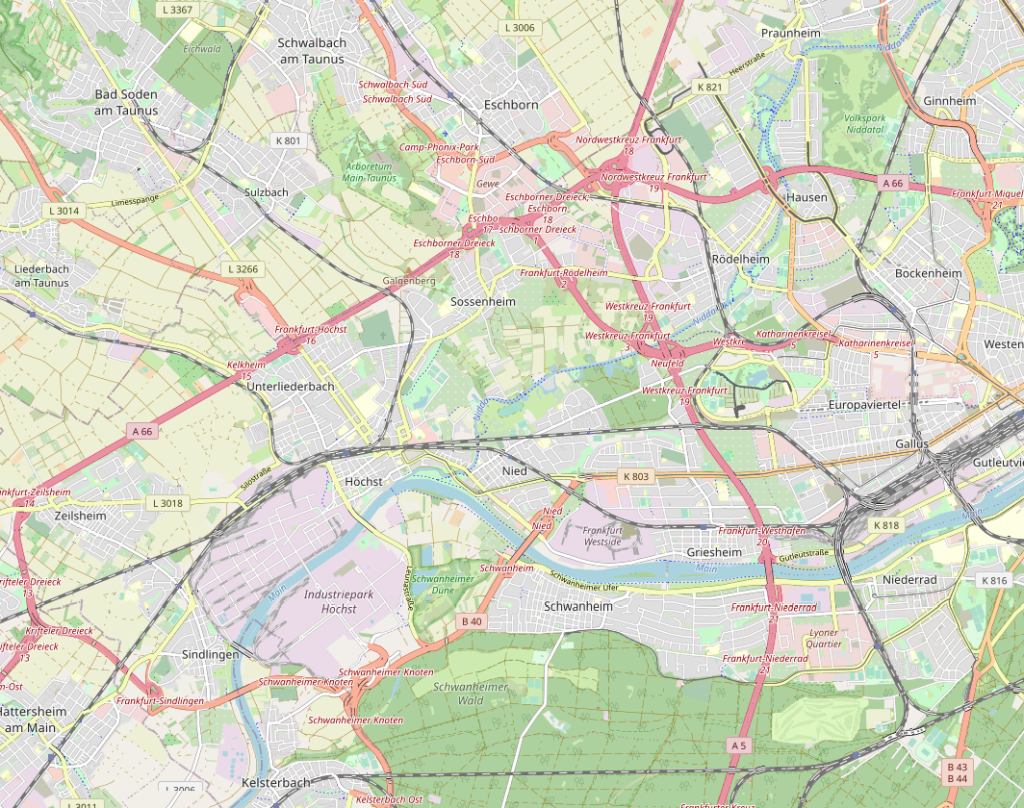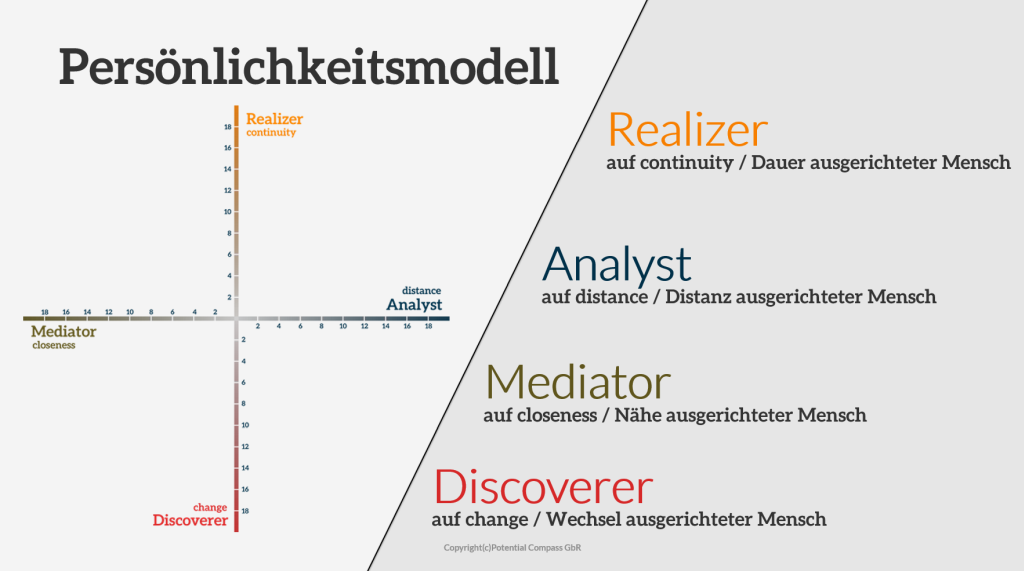Personality Models
Systematic Personality Development
How self and foreign perception can be sustainably improved with the Professional Compass .

What people think about...
- Why am I the way I am?
- What potential is available in me?
- To what extent do I use it?
- How did I become the person I am today?
- And why do I behave the way I do in certain situations?
- If I look at other human beings, why are we so similar and yet so different?
- Why do I get along better with some people than with others?
- In the world of work, HR managers and managers ask themselves, what kind of ”type” is the applicant?
- How well do they fit into the company, the company culture, the team and the tasks?
- Of course, similar questions arise for the applicants themselves.
Do you feel familiar with these questions?
Personality models can help find the answers
Many potential analyses are based on personality models that model human behavior and personality building. They help to make the complexity of the human personality easier to understand in a simplistic way. Because the personality of a person cannot be measured objectively and absolutely.
Like a map the models serve for better orientation, but never replace the landscape itself.

But by reducing complexity, they support new and more differentiated perspectives. These, in turn, allow new development impulses and options for action. The individual person, the HR manager, the executive manager, as well as the consultants and coaches allow them faster and more efficient assessments of the basic personality and the characteristics in action.
Personality models support self-knowledge
The personality models thus support the self-knowledge of the individual or entire team. If they are used to obtain an additional third-party assessment, people experience a confirmation or a correction of your personal view. This makes it possible to better understand and appreciate the unique personality that each person possesses - for each person and for others.
Since the personality models, like any model in science, always represent only an approximation to the actual personality or reality, the examination of them is never free from skepticism and resistance.
Typologies also cause resistance
In connection with the development and application of personality models, individual character properties are usually combined into typologies.
The term typology is proven to be negative for some people. For example, they fear being put in "drawers," from which they "do not come out." Fears that are justified and that should be taken seriously when working with personality models.
What is exciting, however, is that these people in your everyday life certainly also work with divisions, i.e. "drawers." These "drawers" help you to arrange the many topics and things of everyday life.
Human thinking depends on such divisions. Because these "drawers" enable thinking to reconcile the unknown with what is already known. And only then does the knowledge of new things become possible.
What this means for dealing with typologies
Each person is unique and thus has his or her own individual personality. And this personality is very complex. Therefore, even such a perfect typology will never be able to fully grasp the human personality. Nevertheless, it can positively influence self-knowledge and understanding of other people's otherness. Thus, a typology similar to a map serves for better orientation. Here, for example, in the form of an inventory and direction determination for a further personality development.
A major influence, however, is the way in which a typology is integrated into a potential analysis and how it is then applied.
Dealing with potential analyses - an attitude question
A (self) critical, mindful and responsible handling of personality models and potential analyses is indispensable for those responsible for the Potential Compass GbR. Working with clients should, in their opinion, be characterized by an appreciative and resource-oriented attitude. If the personality models and potential analyses are applied appropriately, they are optimal tools to better understand themselves and others. This can improve the interaction between people and make the life of the individual more conscious and liberated.
What this means for the potential compass
The Potential Compass is an instrument for diagnosis and development the human personality. It is based on the findings of modern psychology, in particular on the work of C.G. Jung, Fritz Riemann, Christoph Thomann and the well-known communication scientist Friedemann Schulz von Thun.
In order to prevent the temptation to degrade people to types, the Potential Compass deliberately uses the terms personality models and personality shares described therein.

The term types appears to be too strongly attributable, even if C. G. Jung and Fritz Riemann themselves use this term. Because no human being embodies only a single personality share. There are always manifestations of several personality proportions, of which a proportion often dominates in its expression. Nevertheless, the other personality shares are also effective and visible - although under certain circumstances less clearly and less frequently.
What makes the Potential Compass so pleasantly different
The Potential Compass aims to support individuals and teams in identifying their individual potentials and revealing prospects for further development.
This development is initiated by reflection of one's own self-image, insight into personal strengths and weaknesses, coupled with a foreign image and the impulses for development and change derived therefrom.
The Potential Compass is a resource-oriented and strengthening potential analysis . Comparable to a compass, it supports people in determining contextual their current location, defining a goal, aiming at it, and defining the next path section above it.

On the way itself, he gives orientation to the individual to what extent it approaches its goal or deviates from it. In these moments, people have the opportunity to make a new decision and, if necessary, adjust the way or even the goal. For this reason, the instrument does not contain any rating in the sense of "good" or "bad." It is rather a potential analysis, which offers additional orientation on a personal development journey.
The difference from other potential analyses
And this is also the difference from other potential analyses. The potential Compass describes contextual on the one hand the basic personality signs (Strengthen, talents, talents) of a person which are strengthened as and are seen rather time-stable. On the other hand, however, he also grasps the characteristics human personality, which are often developed in everyday professional life.
As a result, already completed developments are visible and further development prospects are shown. Dynamic processes become recognizable and new developments become possible through consciously made decisions. The Potential Compass is therefore also an ideal instrument for a systemic and process-oriented operation.
Making personality development more conscious and sustainable
If you are also active in the field of personnel development and organizational development, you will find in our Potential Compass scientifically sound potential analyses, with which you can expand your methodological spectrum and carry out your process accompaniments even more effectively. In our Professional or Premium memberships you can choose the most suitable form of cooperation with us.
You want to find out more? Please contact us!
